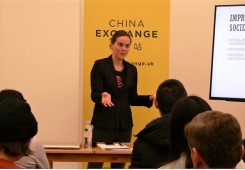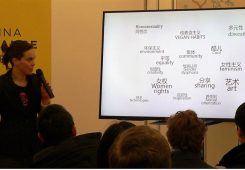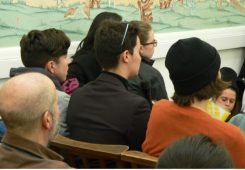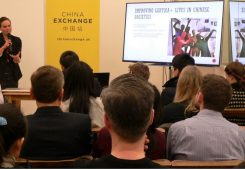Dr Trude Sandberg joined us for Belonging in Beijing, an evening focused on her experiences of co-creating Q-space, a centre for the LGBTQIA community in China’s capital.
She shared stories that reflected how mainstream Chinese society, which emphasises the importance of heterosexual marriage, meeting family obligation and producing children, and the complexities this creates for nonconforming people.
Trude highlighted that people who do not confirm can be vulnerable – they may lack a family support structure; it may be particularly challenging for them to find work or to, for example, fund their transition. She emphasised the need to provide a place for people to train in skills that can create both financial and emotional security in the future.
From initial gatherings of makers and ethical hackers, Q-space has emerged as a place for nonconforming people to gather, share, create, learn and have fun. It facilitates and gives a safe space for queer communities. One quote resonated the themes of the evening’s discussion:
“It serves as a bridge between the real world and the ideal world in our minds that is a more diverse one”.
China’s new NGO laws have changed the way organisations can raise money and structure themselves legally. LGBTQ-related organisations cannot be registered NGOs in China, in contrast to the UK. Q-space operates to raise awareness of diversity in a non-aggressive way.
She described the social and political restraints; the need to negotiate identities; and to create a space for change. There was curiosity from the audience about the support, or lack of it, from the Chinese authorities. Trude explained that constant negotiation and a flexible approach was needed.
Other questions from the audience included: whether recent reports that same sex marriage would be allowed in Taiwan would influence Mainland China; how support is gathered from wider networks; how Q-space balances the needs of Chinese and expat visitors; and the mental health provisions made for LGBTQ communities in China.
This is the second event of our monthly programme Elements Series and the April event will be announced shortly.
About Q-Space
‘我们 can do it!’ is a clever Chinese adaptation of the well-known feminist slogan ‘Women can do it’. The Chinese phonetics of ‘我们’ (‘wŏmen’) translates as “we” and this slogan has been the motto for Q-Space, an LGBTQ+ centre in Beijing that presents itself as a “maker space”, one that goes beyond simple idea exchanges. Q-Space collaborates with artists, academics and makers to impart skills that better lives and broaden minds.
About the speaker
Dr Trude Sundberg is Lecturer of Social Policy at the University of Kent. She is also the Joint Coordinator of the university’s Q-Step Centre, a research centre which aims to combine innovative teaching and applied social sciences. Sundberg has been researching attitudes in relation to vulnerable groups and the legitimacy of welfare systems in Europe, North America and Australia. She is currently researching attitudes, perceptions and values towards social policies and judgement of the “deservingness” of needy groups in China as part of a British Academy funded research project.
With special thanks to Dr Joy Y. Zhang, Senior Lecturer in Sociology from Kent University.




